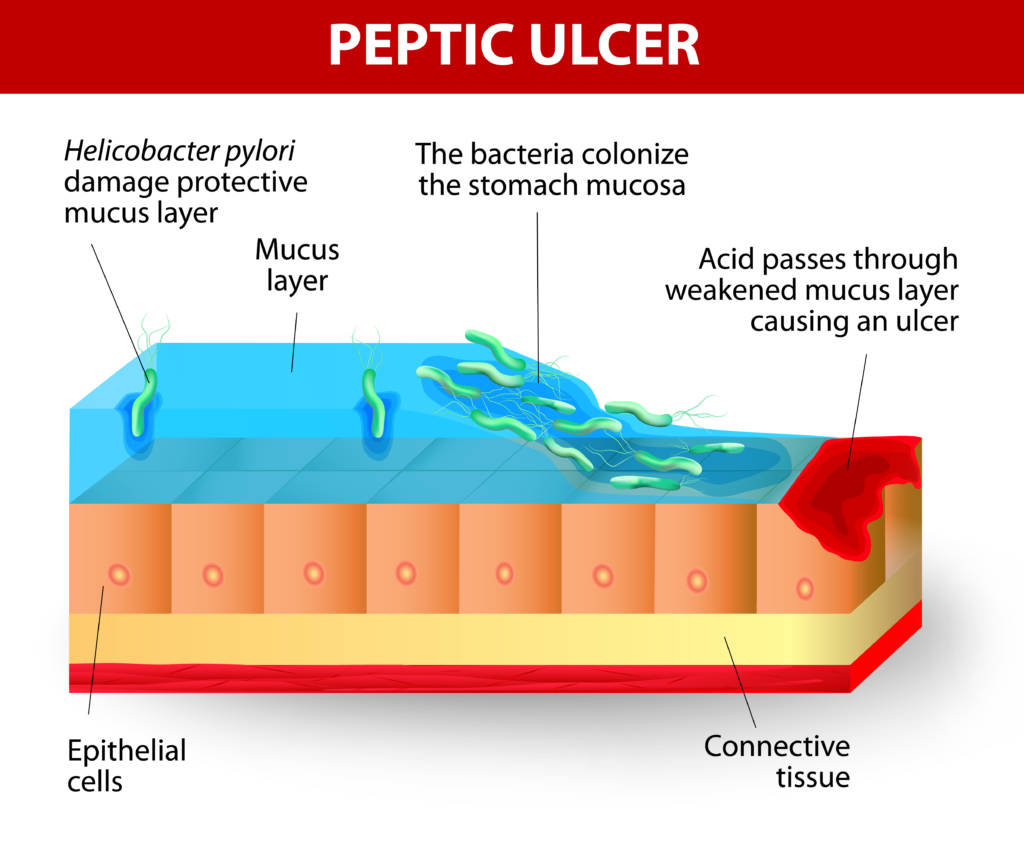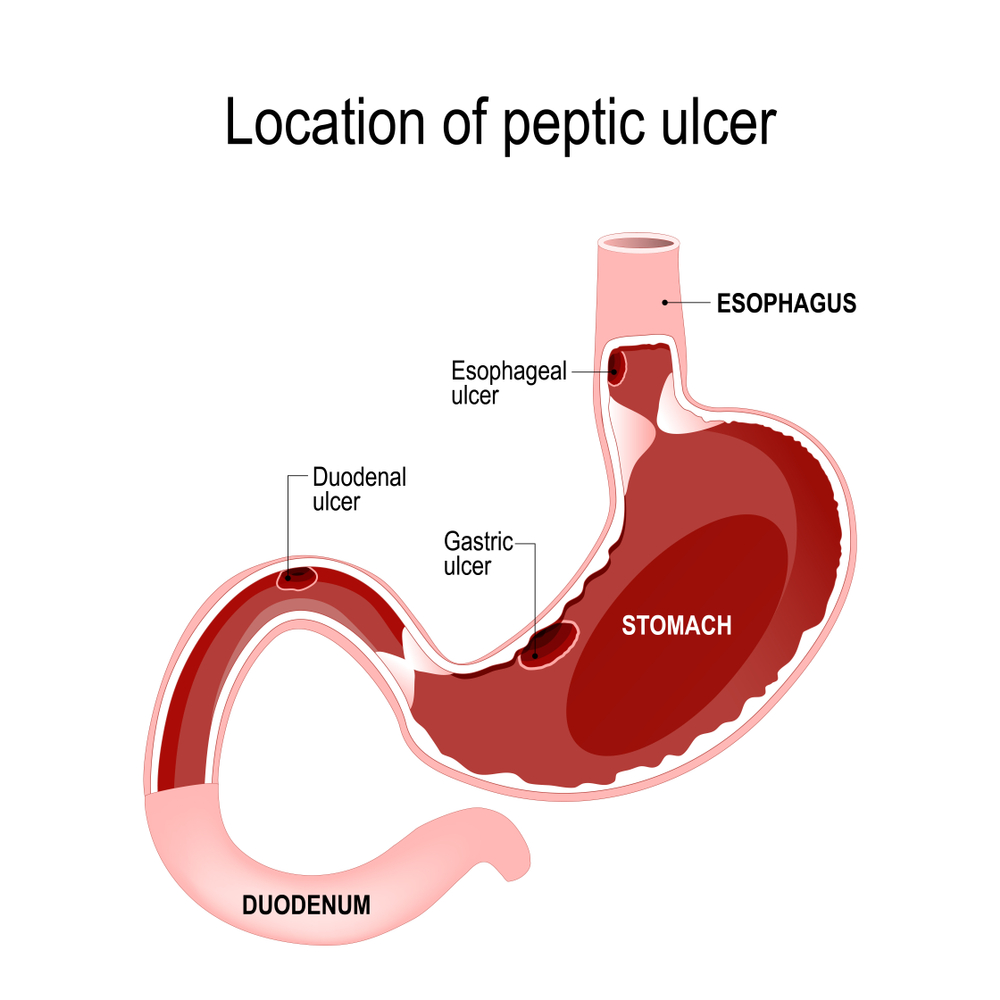Stomach ulcers, also known as gastric ulcers, are open sores that develop on the lining of the stomach. There are a few different types depending on locations. Duodenal ulcers: ulcers that develop in the upper section of the small intestines, called the duodenum, Oesophageal ulcers: develop inside the oesophagus and gastric ulcers that develop in the stomach lining. All of these are sometimes referred to as peptic ulcers. In this article the term stomach ulcer will be used, although the information applies equally to duodenal, gastric and oesophageal ulcers.
Signs and symptoms
The most common symptom of a stomach ulcer is a burning or gnawing pain in the centre of the tummy (abdomen). But stomach ulcers aren’t always painful, and some people may experience other symptoms, such as indigestion, heartburn and feeling sick. It is important to visit your GP if you think you may have a stomach ulcer.

What causes a stomach ulcer?
Stomach ulcers occur when the layer that protects the stomach lining from stomach acid breaks down, which allows the stomach lining to become damaged.
This is usually a result of:
- An infection with Helicobacter pylori (H. pylori) bacteria
- Taking NSAIDS, such as Ibuprofen or aspirin – particularly if they’re taken for a long time or at high doses
- Stomach ulcers can affect people of any age, including children, but mostly occur in people aged 60 or over. Men are more commonly affected than women.
What is Helicobacter pylori (H. pylori) bacteria?
H. pylori infections are common, and it’s possible to be infected without realising it because the infection doesn’t usually cause symptoms. The bacteria live in the stomach lining, and people of all ages can be infected. But in some people, the bacteria can irritate the stomach lining and make it more vulnerable to damage from the stomach acid. It’s not clear exactly why some people are more vulnerable to the effects of H. pylori bacteria than others.

Lifestyle factors?
It used to be thought that stomach ulcers may be caused by certain lifestyle factors, such as spicy foods, stress and alcohol. Emotional stress has been shown to increase acid production in the stomach. The reported association between stress and peptic ulcer might be attributable to a stress-induced increase in gastric acidity. There’s little hard evidence to confirm that this is the case, but these factors may make the symptoms of ulcers worse. But it’s thought that smoking increases your risk of developing stomach ulcers and may make treatment less effective.

Treatment
With treatment, most stomach ulcers will heal within a month or two. The treatment recommended for you will depend on what caused the ulcer. Most people will be prescribed a medication called a proton pump inhibitor (PPI) to reduce the amount of acid their stomach produces and allow the ulcer to heal naturally. If an H. pylori infection is responsible for the ulcers, antibiotics will also be used to kill the bacteria, which should prevent the ulcer coming back. If the ulcers are caused by the use of NSAIDs, PPIs are usually prescribed and your doctor will discuss whether you should keep using NSAIDs. Alternative medication to NSAIDs, such as paracetamol, may be recommended.
Food Support?
Fibre slows the movement of food and acidic fluid from the stomach to the intestines, which should help those with duodenal, though not stomach ulcers. Salt is a stomach and intestinal irritant. Higher intakes of salt have been linked to higher risk of stomach (though not duodenal) ulcer. Sugar has also been reported to increase stomach acidity, which could aggravate ulcer symptoms.

Identifying food allergies or intolerances may also help. The relationship between food allergies and peptic ulcers has been reported at least as far back as the 1930s. Exposing the lining of the stomach to foods to which a person is allergic has been reported to cause bleeding in the stomach. Although additional research is needed, avoiding food allergens may be helpful for people with peptic ulcers. Consult with a doctor or health professional to determine food sensitivities.

Key points
- Peptic Ulcers are sores that develop in the lining of the stomach, lower oesophagus, or small intestine.
- Ulcers occur when the layer that protects the stomach lining from stomach acid breaks down, which allows the stomach lining to become damaged.
- This is usually a result of an infection with Helicobacter pylori (H. pylori) bacteria Or Taking NSAIDS.
- It used to be thought that stomach ulcers may be caused by certain lifestyle factors, such as spicy foods, stress and alcohol.
- Most people will be prescribed a medication called a proton pump inhibitor (PPI) to reduce the amount of acid their stomach produces and allow the ulcer to heal naturally.
- Increasing fibre, decreasing salt and sugar and identifying food allergies and sensitivities may also help.
Thank you for reading
Regards
Fiona Waring
Dip Nut, BSc.(Hons), MSc PHN, ANutr
Nutritional Therapist
M: +44 07957 267 964
eatyourgreens@fionawaring.com
‘Registered with the Association for Nutrition – www.associationfornutrition.org
Protecting the public and promoting high standards in evidence-based science and professional practice of nutrition.’
